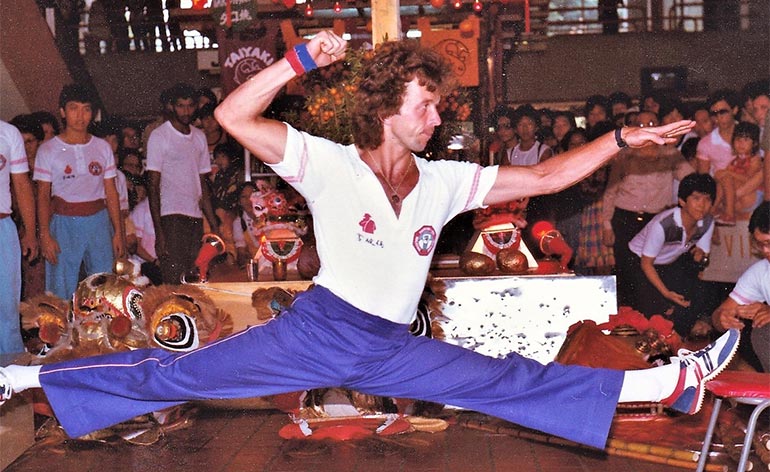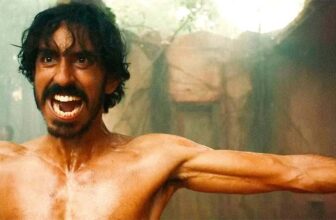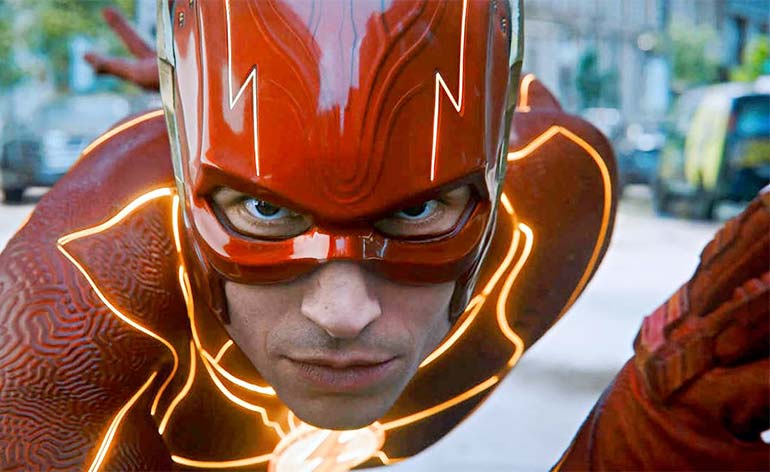
Natan Levy is a promising MMA prospect from Israel, and currently possesses a record of 5-0 with 1 professional fight. He’s been training formally in MMA for the past 5 years and now trains at the world famous Syndicate MMA in Las Vegas. He is known for his dynamic striking and relentless grappling. He very recently won his last fight at LFA (Legacy Fighting Alliance) 36 by armbar submission at just one minute 25 seconds of the first round and then travelled to Las Vegas for his next fight. He also sat down with KFK to discuss the life of an aspiring elite MMA fighter.
Hi Natan, nice to have you with us! Hope you’re doing well?
I’m doing great, thank you!
Have you taken a look at our site; what do you think of the name Kung Fu Kingdom, or KFK for short?
I sure have, many times. It’s cool!
Thanks! Let’s start out with some basics. When and where were you born?
I was born on September 30th, 1991, in Paris.
What’s your height and weight?
I’m 5’9 (1.77m) tall and usually walk around at 75kg (fighting at 66kg).
How did you get started in martial arts and how old were you?
So, I got interested in martial arts basically at age zero watching Rocky and Bruce Lee movies and all that good stuff. I always wanted to take martial arts but never got seriously into it. I did some Taekwondo when I was 3 or 4 years old and moved to Israel when I was five. Then I wanted to do some judo, some Karate but nothing really stuck. I didn’t have the commitment.
Who would you credit with having most influenced you in the martial arts?
Basically, I’d say the movies got me into martial arts, like a lot of people. I wanted to be a boxer, but when I signed up to Kung Fu at 15, that was real a turning point in my life towards martial arts.
Had you competed in any martial arts tournaments and championship matches before you fought in MMA?
I did the Gracie worlds. It is no-gi grappling, submission only in Las Vegas. I took first place.
Onto your MMA career, before you became an MMA fighter you achieved a 3rd Dan in Karate. What is it that originally led you to Karate?
I wanted to get serious with martial arts so I started doing kickboxing and let’s say a rough version of MMA. In high school I met some people and they were like “Oh, you do martial arts? Let’s spar a little bit”. So we sparred and they kicked my ass. And I was like: “where did you learn those crazy kicks you just beat me with?” So they told me “come to our dojo, it’s the best.” So I went there and that’s were it all started.
Despite being a trained martial artist, there’s quite a contrast between karate and MMA, so what made you decide to become an MMA fighter?
Well, growing up I dreamed of being a boxer but while developing in karate I got deep into watching UFC and K1 fights and it made the most sense to me since I wanted to compete but I didn’t want to compete in point fighting. I wanted to compete in the closest thing to real fighting and that’s MMA.
Fight #1 won by Guillotine Choke in 56 seconds:
So you think MMA is the closest competition to real martial arts and a real fight?
Yeah, I believe so. I think a lot of times there are many rules and regulations. People think it’s cage fighting with no rules. No, there are a ton of rules. But I think it’s still better to train MMA and hit for real than to say “oh, I could’ve hit you in the eye, I could have hit you in the balls.” It’s all good to train for self defence, and you shouldn’t eye gouge your partner, but let’s do this and add some realism.
Considering your previous training, what sort of things, and how much did you have to learn, in order to transition over into MMA?
So the first thing I had to learn was to adapt my striking to MMA. Because this was what I was good at, and might as well use that. You have to make a few adjustments. Of course, we did hit the body hard and everything but we wouldn’t hit the face too hard. It was more like skin-touch.
You would stand around and the moment your teacher said ‘ajima’ you immediately ran towards your opponent with flying kicks and punches trying to get him down quick: if you do that in a street fight it makes sense. The moment someone attacks you in a street fight you have to react fast. It will only last 30 seconds tops, but in an MMA fight you’re going to get tired and the guy you’re fighting is supposedly as good as you are. It is more dangerous, you have to move around, you have to make him react, you have to learn. So it’s different but this is what I had to learn first. Then, get into wrestling, Jiu-jitsu, boxing, Muay Thai, and all of these things.
Fight #2 won by Rear Naked Choke in 50 seconds:
You finished 4 of your 5 fights with submissions, are these techniques which come from your karate background or more from MMA?
I would say MMA, but you can’t take my base away. You can say a building is beautiful, but without the foundations it will fall. So, I surprised myself and my coaches as well. We were all laughing, Who could believe? Not that I am bad at it but I’m a striker. Everybody was like: ‘Natan’s going to bring the KO’, and I submit everyone. It was funny, but what happened basically is either they didn’t want to stand with me or the submission was just there. But it’s a combination of everything. If I didn’t throw hard strikes, I wouldn’t get the submissions.
So striking is the basis for your MMA game?
Yep. Definitely.
Are there any techniques or principles that you learnt in karate which you’ve taken into MMA which you find particularly effective?
I would say a lot of Ashi Barai (leg sweep) techniques, I use them all the time. It’s more of a technique than a principle but people don’t learn it. Some people might know a couple from wrestling or a couple from judo or whatever, but when you know fifteen good leg sweeps and you can do it from every angle it’s very dangerous. People are much better wrestlers than I am, and we’re going for takedowns in practice. I have no chance taking them down in (a) wrestling (match), but when I do something they don’t even know about, then I can get them on their back. A lot of kuzushi works; pushing when they are pulling, pulling when they are pushing, using this against them.
Throughout your MMA training so far, have you still felt the need to keep up your karate practice as well?
I do, but not in the way that I used to. When I used to train, I would do way more Katas, and I think that Katas are great for learning to control your body and they give you the tools, it’s my base that includes everything; the Katas, the Kumite, the drills, the flexibility and everything. I got into Kyokushin karate lately and have noticed a big step up in my karate in the past months.
I do a lot of kicking, distance and movement drills that are from karate, but I don’t do the full Katas often. I use the principles from the Kata, but then I practice them with a partner trying to attack me for real.
Are there any particular karate training methods or techniques which you find help you prepare for a fight mentally?
I feel that body conditioning is definitely a factor. I remember the days when my training partners and I would kick each others’ thighs the hardest we could, giving 100% with every kick and we just couldn’t hurt each other! It hurts more to kick than getting kicked. So I feel when you go into a fight with a strong body knowing you’re not going to get hit and crumble, you’ll have more confidence. Of course, you still have to be careful, you can’t take too many kicks or punches to the body and thigh, but it helps knowing you can take it.
Which aspects of traditional martial arts would you like to see more of in MMA?
Well I think we’re seeing more traditional martial arts in MMA recently. It’s definitely making a comeback. The first UFC fighters would try fancy moves but would get beaten; without the right fighting fundamentals all the fancy spinning stuff is nothing.
Today, people are using a lot of spinning back kicks, leg sweeps, things that, a while back people claimed wouldn’t work in the ring. But if you have good fundamentals it can work. If it’s the only thing you can do then it’s not going to work, but if you can hide it, fake something else, then throw the spinning kick it might work, and when it does, it’s devastating.
Fight #3 won by 30-27 Unanimous Decision:
What are your long term goals in MMA, in terms of your career?
I intend on being a world champion. I’m all in.
So your fighting style is quite tenacious and you’ve obviously been submitting opponents, do you think this will make it easier to get attention from fans and organizations like Bellator and the UFC?
I think so. I’ve already got some attention on me.
Who’d be your dream match-up in the cage, any martial artist, dead or alive?
I want to fight whoever is the number one guy. But I know it takes time and I am building my way there. No shortcuts.
You fight at 145 pounds (66kg). Are there any Featherweights around the world who are currently active who you would like to fight?
I’ll eventually fight them all, some are big names now and some of my generation that are coming up. Whoever has the belt, whoever is in charge. So right now, I want to fight my way to a title in the LFA and then the UFC.
You just want to fight?
A fighter needs to fight.
Tell us a bit more about your next fight.
I will announce my next fight in the coming weeks
Have you been involved in any movie work or commercials? Tell us a little about that?
I was featured in a documentary, Uechi Ryu: The Master’s Edition. It’s about the style that I’m a black belt in. It’s a really beautiful movie and is now available on YouTube for free.
Is that something that you would like to do more of in the future?
Sure. I don’t know about my acting but I sure love to show people my martial arts skills and educate people. This is definitely something I like doing, not in a condescending way, but I always learn new, cool things that blow my mind that I can’t believe I didn’t know and I like to share those.
Who do you most admire in the martial arts movie world? Earlier you mentioned Bruce Lee…
I grew up on his movies but when you grow up, you find out what are myths and what are facts. To be honest, since I’ve grown up I haven’t been into martial arts movies. It’s hard to see what is fake and what isn’t. I’m like, “that sh*t wouldn’t work” and that kind of makes it hard to watch martial arts movies. But I watch them from time to time. When I turn my brain off.
That said…can you give us a your Top 5 favourite martial arts films?
All movies that I grew up on, I’m always going to be a kid again when watching them, it’s going to get nostalgic so: “The Big Boss”, “The Quest”, “Enter the Dragon”, “Rocky”, and “Fearless” with Jet Li.
Are there any martial arts masters or martial artists around the world who you would like to work or train with?
I have been lucky enough to work with some of the best teachers in the world, each in their own discipline. What’s most important to me is that the style is adaptable to MMA and that the teachers and myself are a good fit.
How often do you train and what do your workouts consist of. How are they divided up?
When I’m in camp I train 3 to 5 times per day.
I would say that when I am in Las Vegas training for a fight, I train MMA every morning for an hour and a half session. That’s on drilling, working positions or just straight up sparring. Then I go to my head striking coach, Jimmy Giff and we work on my boxing and kicking. That’s usually more like a private session. Then I do an hour and a half of strength and conditioning. I take a break because this is the hardest session of the day. Rest a little bit, eat and come back at night and either do wrestling, jiu jitsu or both.
Fight #4 won by Guillotine Choke in 45 seconds of round 3:
What’s your favourite exercise, and what specific training techniques do you find really work for you?
The karate techniques. When you put them into the MMA fundamentals I feel that it gives you an edge. You definitely practice something that others don’t. But at the same time you have to do what they’re doing so they won’t surprise you.
Again, a lot of my work is drilling. Boxing, the jab, moving around and then throwing a kick, a spinning kick, a sweep, something they don’t know. That is usually how I get them. I think strength and conditioning has got to be the most important training that I do. The reality is, whatever technique I do, whoever gets tired in the fight first is usually going to lose. Yes things can change: it’s not simple math. But if we are even close to equal, the one who gets tired first, loses. The technique is important, but the day you meet someone who is on your level, it goes down to cardio, muscle endurance, and of course, heart, and you have to stand tough.
What is the most dangerous thing you have done in training?
I would say blindfolded sparring in karate. Not light sparring, we would spar bare-knuckle with face contact. Basically, all we would have is a mouth piece. The craziest thing is that you actually get good at it.
What is the most serious injury that you have sustained an how did you go about healing it?
I broke two bones in my left hand in my last amateur fight against Geoff Mellor, only a few seconds before finishing him with a choke. Recovery was tough. The most gruesome one was breaking my two front teeth. I got punched without a glove and without a mouthpiece and it was dumb and I learned my lesson. But at that point, my two front teeth pointed straight to the back of my mouth, but were still connected. So I pulled them back with my thumbs to straighten them.
How do you unwind from a day of hard training? What is a good stress buster you can recommend to others?
Just chill and watch TV shows, movies and play video games…
What are a few of your favourite pieces of equipment: training gear, that you really enjoy using?
I like using long Venum rashguards. I’d rather be too hot than cold when training, you are less prone to injuries that way. I also think its good for your surroundings. If you go to train with a tank top and your sweaty arm pits get in someone’s face that’s hardly courteous!
What’s one geeky thing that people don’t know about you?
I watch a lot of TV series, I learned English from TV and sucked at it in school. I was in fifth grade and everybody was talking and I didn’t know how to say ‘dog’ and ‘house’ and the simplest words. I learned everything from watching Dragonball Z and movies!
Where’s the best place for people to go and find out more about you?
The best place is my Instagram which is like a journal. I post more there about parts of my day and training. They can also visit my Facebook page.
Well, Natan, thank you, it’s been a real pleasure getting to know you better. I hope this interview gives our readers a unique glimpse into the life of Natan Levy. We wish you all the best in your promising MMA career and hope you reach the highest level possible, and make it to world champion. Keep up the training and keep in touch!
Thanks very much, I really appreciate it.
Looks like Natan’s a fighter on a mission; what do you think of his chances to become MMA world champion someday? Which other rising stars are you watching out for and who, (past or present) do you most rate in MMA? Let us know in the comments below: like, share & join in the conversation on Facebook. You can also follow us on Twitter and Instagram too! (Get ALL-IN with our other FU-centric interviews!)





























A promising fighter who’d def should be seen on UFC soon.. he possess some devastating skills from Uechi ryu followed by many other styles.